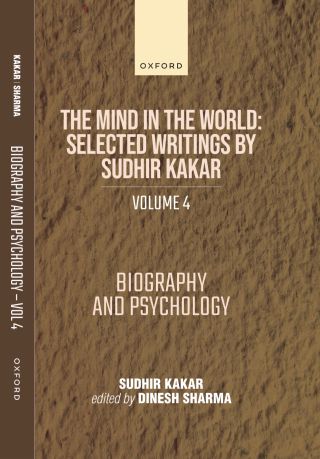Psychoanalysis
How Sudhir Kakar Redefined the Inner World
A Personal Perspective: The pioneering work of an Indian psychoanalyst.
Updated May 4, 2024 Reviewed by Abigail Fagan
Sometimes it takes almost a lifetime to fully appreciate a guru shishya relationship, or the teacher-student relationship. Such may have been my relationship with Professor Sudhir Kakar, India’s foremost psychoanalyst, who passed away recently, on April 22, 2024.
I met him in my early twenties, attended his seminars at the University of Chicago, and stayed in touch with him through the years. We collaborated on three academic books: first was a publication from my dissertation research based on his theories; second was a festschrift; and third was the book on biography and psychology.

Luckily, I was able to attend his 70th birthday in New York City at his son’s rooftop apartment in the Village, and his 85th birthday in the seaside home in Goa, India, where he had lived for almost a quarter century.
Due to the physical distance – his base was in India, and I was in the US – his image remained fixed in time, larger than life, scholar, writer, and teacher of psychoanalysis, religion, and mysticism. With his thick flowing locks and gentle manner, he was always approachable, but never to be challenged.
The physical distance was just as important as the analytic distance. And because my family had migrated “out of India” during the Emergency, I later realized, he was my psychological bridge to the India of my lost childhood, the loss of matra-bhumi.
Kakar was my parents' generation, the Indians who came of age after the Partition in 1947, something I fully realized much later. He was born in Nanital in 1938, grew up in Sargodha, Rohtak, and Delhi, but was educated in India, US, and Germany. That he was a projection of my lost objects – my mother-figure and father-figure – all rolled into one, I never fully acknowledged till recently, when I saw him last year in Goa. Sometimes, a cigar is just a cigar! At other times, a cigar is a lingam.
Intellectually, because Kakar was trained in Freudian and Eriksonian psychology, he was like a tribal elder. As Harold Coward, a Canadian professor of Hinduism, wrote in the festschrift I edited a decade ago, “Kakar, in tune with Indian philosophy, psychology, and religion, holds that the ability to realize mystical experience is enhanced through the guru shishya or teacher-student relationship as exemplified in most Hindu and Buddhist schools.”
Robert LeVine, my advisor at Harvard, has said Kakar was an outstanding explorer of “the cultural psyche.” Richard Shweder, a professor at the University of Chicago, who played tennis with him in Chicago and Berlin, has said Kakar was a pioneering cultural psychologist of India.
Salman Akhtar, a psychoanalyst in Philadelphia told me, “he was missing Sudhir Kakar in the city of brotherly love.” Was Kakar India’s Freud? It may be controversial to suggest Kakar was India’s Freud, Akhtar said. The honor of India’s Freud, “will go to Girindrashekar Bose who wrote a stunning psychoanalytic book in 1921 and maintained correspondence with Freud till a year and a half before the latter’s death in 1939,” according to Akhtar. However, Kakar reformed Freudian theories for India, very much like Erikson, his guru, did for the West.
Wendy Doniger, a professor emerita in the Divinity School at the University of Chicago, who was in touch with Kakar recently, said he “provided access to India’s socioemotional life – religious, political, and erotic emotions.” She spoke with him regularly by Skype, till the very last week when his health worsened. She said his book The Colors of Violence is very relevant today, and his writings on Gandhi, the man, were key to his biographical books.
Kakar’s essays on Ramakrishna and his disciples such as Vivekananda redefined the study of guru shishya relationship in the study of religion. As Jeffery Kripal told me, “I cannot claim to know the full sweep of his work, but his early classics, which so impacted my generation, were books like The Inner World, Shamans, Mystics, and Doctors, and The Analyst and the Mystic.”
“What Sudhir showed through such works is that thought, and particularly psychological thought, need not be bound to a particular place or time; that it can give us powerful insight into the human condition anywhere and everywhere, even as it also needs to draw on and think out of the complexities and languages of the local culture, particularly its mythologies and mystical traditions. This, I think, is one of Sudhir's lasting impact – this both-and, this comparative psychoanalysis, as it were,” Kripal said.
Yogi Trivedi, a journalist and scholar of the Swaminarayan tradition at Columbia University, said Kakar is read widely by scholars of religion and South Asia. Even those who did not prescribe to his psychoanalytical view of religion and Hinduism appreciated his ability to see, question, and believe.
June McDaniel, Professor of religion at College of Charleston, has said Kakar’s writings offered new insights into ecstatic mysticism, especially, Bengali mysticism.
Dan Meckel, a psychoanalyst and scholar of religion and psychology said, “Kakar’s psychoanalytic vision of psyche came to include the reality of the “spirit,” which he linked to humankind’s intimate connection with the world.”
John Munder Ross, a psychoanalyst, who had known Kakar for almost 60 years, since they were together in Erikson’s Harvard seminar on the lifecycle, sent me deeply touching words about their friendship:
Sudhir
I’m about to put together my thoughts
about my feelings starting with earlier days with you
Sudhir, and of course Erik
I tried something formal
But it didn’t capture that literally wonderful time
and the sadness
now that you had gone while still alive
Maybe because you were cremated
My mother and father were
And their life never went away
Returned
---
Sudhir entered my life after Erik
In what was called an “independent study”
Melville’s Pierre; or, the Ambiguities.
Or what was called “Tobia”,
Our Viking of a Professor asked
That means “beautiful” in Hebrew
Doesn’t it?
---
An actor I had asked my last dressier to join us
The one who put on my tights in the “Ooo,”
Sudhir chuckled,
Ever more comfortable in a new setting.
Well, he’d traveled Asia and Europe.
Not me,
Not yet.
***
Reading about Melville and Erikson again, I was reminded of another American bard of New England, Robert Frost, who was admired by both India’s first Prime Minister Nehru and Professor Kakar:
The woods are lovely, dark and deep,
But I have promises to keep,
And miles to go before I sleep,
And miles to go before I sleep.
Kakar received many awards – Boyer Prize, Kardiner Award, and the Goethe Medal, Germany’s highest civilian honor. When I called to congratulate him, he said nonchalantly, “It’s more credit than cash”!
Godspeed, Herr Doktor Professor Kakar! You will be greatly missed.




